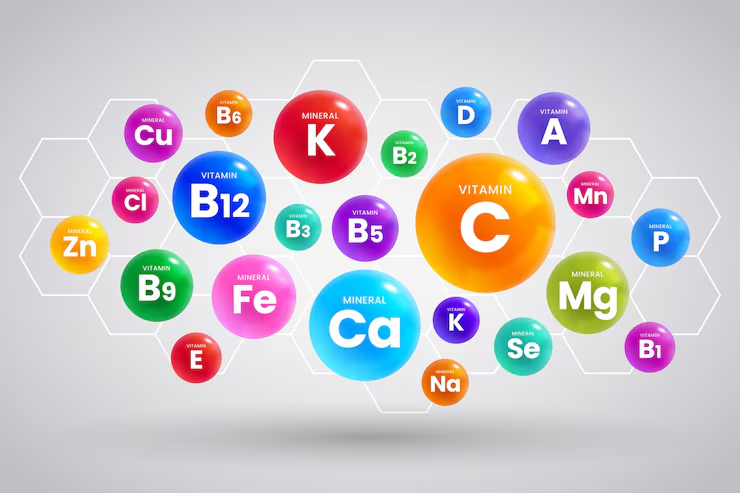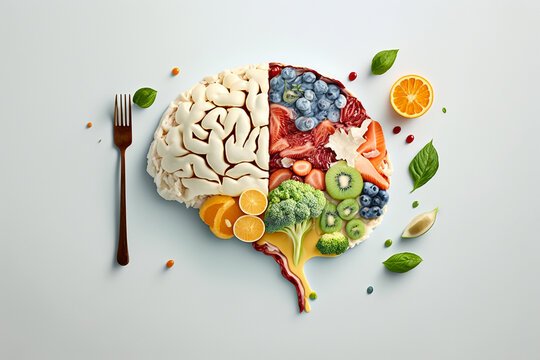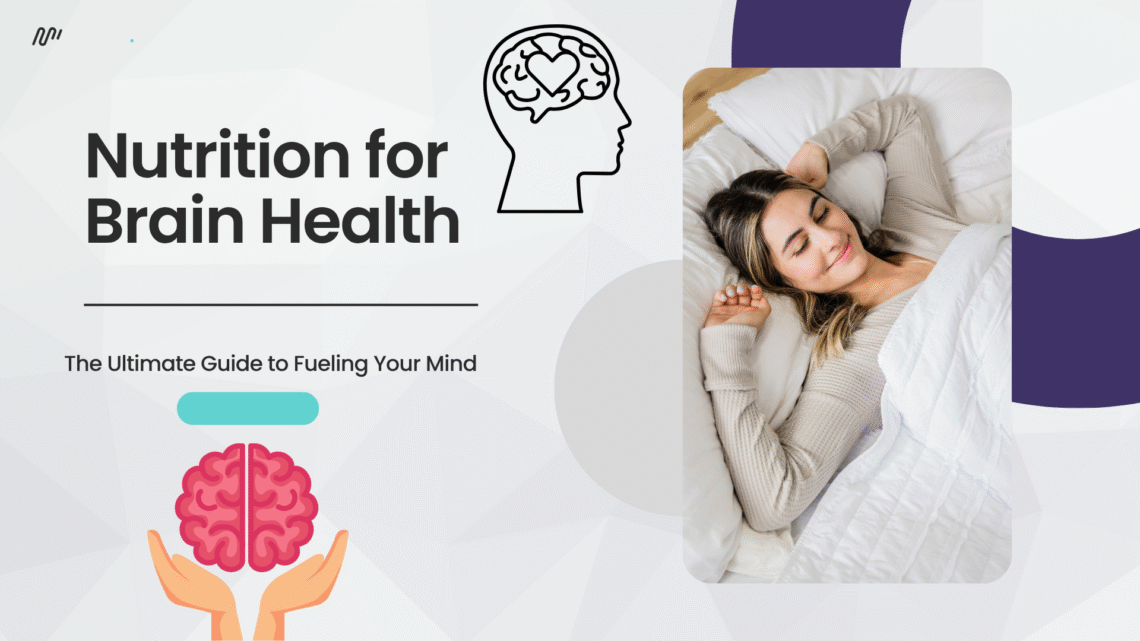In today’s fast-paced, always-on world, our brains face constant exposure to information overload, stress, and environmental toxins. Despite this, many people focus more on physical fitness and overlook the importance of caring for the brain. Yet, our mental well-being is deeply tied to how we nourish and protect this vital organ.
The brain acts as the body’s command center, controlling every thought, emotion, and physical movement. Its health directly influences our ability to think clearly, make decisions, and stay emotionally balanced. Without proper care, our cognitive performance and emotional stability can quickly decline.
A key way to strengthen the brain is through nutrition for brain health. By choosing nutrient-rich foods and mindful eating habits, we can support memory, mood, and mental sharpness. Prioritizing nutrition for brain health not only enhances daily performance but also protects against long-term cognitive decline.
One of the most powerful ways to support brain health is through nutrition. By making conscious choices about what we eat, we can boost our cognitive function, protect against neurodegenerative diseases, and improve mental resilience. Let’s explore how nutrition can transform your brain health, discover the essential nutrients you need, and learn practical, science-backed tips to keep your mind sharp and vibrant.
Why Nutrition is Crucial for Brain Health

The human brain makes up just 2% of our body weight, yet it astonishingly consumes about 20% of the body’s total energy. This high energy demand highlights just how metabolically active and vital the brain is to our daily functioning. It requires a constant and steady supply of nutrients to stay healthy and sharp.
Unlike muscles, which get to rest and recover, the brain never stops working. It operates 24/7, whether we’re awake or asleep, continuously managing essential functions such as breathing, heartbeat, and hormone balance. This non-stop activity makes nutrition for brain health even more important.
Proper nutrition for brain health fuels mental processes like learning, decision-making, and emotional regulation. By providing the brain with the right nutrients, we support memory, protect against cognitive decline, and maintain overall mental clarity. Investing in the right foods is a powerful way to keep this vital organ thriving throughout life.
Without the right nutrients, the brain cannot produce the necessary neurotransmitters, maintain strong neural connections, or protect itself from oxidative damage. Poor nutrition has been linked to brain fog, depression, anxiety, impaired memory, and even increased risk of conditions like Alzheimer’s disease and dementia.
Key Nutrients for Optimal Brain Function
1. Omega-3 Fatty Acids
Omega-3 fatty acids, especially DHA (docosahexaenoic acid) and EPA (eicosapentaenoic acid), play a vital role in nutrition for brain health. These essential fats are critical for building and maintaining strong brain cell membranes, which support efficient communication between brain cells.
In addition to structural benefits, omega-3 fatty acids offer powerful anti-inflammatory effects. Chronic inflammation can damage brain cells and accelerate cognitive decline, making these healthy fats essential for protecting overall brain function. Including them in your diet is a proactive way to maintain mental clarity and focus.
To boost nutrition for brain health, it’s important to consume omega-3-rich foods like salmon, sardines, walnuts, chia seeds, and flaxseeds regularly. By prioritizing these nutrient-dense options, you can enhance memory, support mood stability, and reduce the risk of age-related cognitive decline. Embracing omega-3s is a smart strategy for anyone looking to protect and optimize their brain health long-term.
- Sources: Fatty fish (salmon, sardines, mackerel), walnuts, chia seeds, flaxseeds, algae-based supplements.
- Benefits: Improve memory, enhance learning, support mood, and may reduce risk of age-related cognitive decline.
2. Antioxidants (Nutrition for Brain Health)
The brain is extremely vulnerable to oxidative stress, a process where unstable molecules called free radicals damage brain cells and speed up aging. Over time, this damage can impair memory, slow thinking, and increase the risk of neurological diseases. That’s why focusing on nutrition for brain health is so important.
Antioxidants act as powerful defenders against these harmful free radicals. They help protect delicate brain cells, maintain strong neural connections, and support overall cognitive function. Incorporating antioxidants into your diet is a simple yet effective way to keep your mind sharp and resilient.
To improve nutrition for brain health, include antioxidant-rich foods like berries, dark chocolate, leafy greens, nuts, and green tea. These nutrient-packed options not only fight oxidative stress but also promote mental clarity and long-term brain vitality. Prioritizing antioxidants is an essential step toward a healthier, more youthful brain throughout life.
- Sources: Berries (blueberries, strawberries, blackberries), dark chocolate, spinach, kale, nuts, green tea.
- Benefits: Protect brain cells, support cognitive longevity, improve neuroplasticity.
3. B Vitamins
Vitamins B6, B9 (folate), and B12 are crucial pillars of nutrition for brain health. These essential B vitamins support the brain’s energy production, helping fuel its nonstop activity and keep mental processes running smoothly throughout the day.

Beyond providing energy, these vitamins play a key role in creating important neurotransmitters like serotonin and dopamine. These chemicals are responsible for regulating mood, motivation, and focus, making them essential for emotional balance and mental clarity. Proper levels of B vitamins can help reduce feelings of depression and improve overall cognitive performance.
To strengthen nutrition for brain health, include foods rich in these vitamins such as leafy greens, eggs, fish, dairy products, legumes, and whole grains. By adding these nutrient-packed options to your daily meals, you can support a healthier mind, enhance memory, and promote a positive mood — all vital for long-term brain vitality and overall well-being.
.
- Sources: Leafy greens, eggs, dairy, legumes, whole grains, lean meats.
- Benefits: Enhance memory, improve mood, reduce brain shrinkage related to aging.
4. Vitamin E
Vitamin E is a powerful fat-soluble antioxidant that protects cell membranes from damage.
- Sources: Nuts, seeds, avocado, olive oil, sunflower seeds.
- Benefits: May slow cognitive decline and protect against Alzheimer’s disease.
5. Vitamin D (Nutrition for Brain Health)
Vitamin D supports nerve growth and protects against neuroinflammation.
- Sources: Sunlight, fortified dairy, fatty fish, mushrooms.
- Benefits: Boosts mood, supports overall brain function, reduces risk of depression.
6. Polyphenols
These plant compounds have anti-inflammatory and antioxidant effects.
- Sources: Berries, grapes, dark chocolate, tea, coffee, olives.
- Benefits: Improve blood flow to the brain, enhance memory, protect against cognitive decline.
7. Magnesium
Magnesium plays a role in neurotransmission and neuroplasticity (the brain’s ability to adapt).
- Sources: Pumpkin seeds, almonds, spinach, black beans, dark chocolate.
- Benefits: Supports learning, reduces risk of depression, improves sleep.
8. Zinc
Zinc contributes to healthy brain signaling and reduces oxidative stress.
- Sources: Oysters, beef, pumpkin seeds, cashews, chickpeas.
- Benefits: Supports cognition, helps manage stress responses.
Top 8 Effective Tips for Brain-Boosting Nutrition
Tip 1: Prioritize Omega-3-Rich Foods
To support nutrition for brain health, aim to include fatty fish like salmon, sardines, or mackerel in your meals at least twice a week. These fish are rich in omega-3 fatty acids, which are essential for protecting brain cells, improving memory, and enhancing overall cognitive function.
If you follow a vegetarian or vegan diet, you can still prioritize nutrition for brain health by adding plant-based sources of omega-3s to your daily routine. Chia seeds, flaxseeds, and walnuts are excellent choices that provide important healthy fats to keep your mind sharp and resilient.
Additionally, consider algae-based omega-3 supplements if you struggle to get enough through food alone. These supplements offer a plant-friendly way to meet your nutritional needs and support long-term brain health. By making these mindful choices, you can strengthen your focus, support mood balance, and protect your brain as you age.
Why? Omega-3s help maintain flexible cell membranes in the brain, enabling efficient communication between neurons. They are also vital in reducing inflammation, which has been implicated in depression and neurodegenerative diseases.
Tip 2: Embrace a Rainbow of Fruits and Vegetables
To boost nutrition for brain health, make it a habit to eat a wide variety of colorful fruits and vegetables every day. Each vibrant color you see on your plate represents different antioxidants and phytonutrients that help protect your brain from damage and support strong cognitive function.
For example, red and purple fruits like berries are packed with anthocyanins, which are known to improve memory and protect against age-related decline. Meanwhile, orange and yellow vegetables like carrots and bell peppers provide carotenoids that support overall brain cell health and keep your mind sharp.
Prioritizing a rainbow of produce in your meals ensures that you’re getting a diverse range of brain-supporting nutrients. This approach to nutrition for brain health can help enhance focus, improve mood, and strengthen memory. By filling your plate with different colors, you’re taking a simple yet powerful step toward a more vibrant, resilient brain.
Why? For example, anthocyanins in blueberries improve memory, while carotenoids in carrots support cognitive longevity. The broader the variety, the better the protective effects against cognitive decline.
Tip 3: Support Gut Health
The gut and brain share a powerful connection known as the gut-brain axis, which plays a crucial role in overall mental well-being. A balanced and diverse gut microbiome supports strong communication between the digestive system and the brain, helping regulate mood and emotional health. This connection makes nutrition for brain health even more important.
A healthy gut can improve memory, enhance focus, and even reduce feelings of anxiety and depression. By taking care of your gut, you are indirectly protecting and supporting your brain’s performance and long-term vitality.
To strengthen nutrition for brain health, include gut-friendly foods in your diet, such as yogurt, kefir, sauerkraut, kimchi, and fiber-rich vegetables. These foods nourish beneficial gut bacteria, creating a healthier internal environment. Prioritizing your gut health is a simple yet powerful way to boost cognitive function and promote a happier, sharper mind throughout life.
How? Include fermented foods (yogurt, kimchi, sauerkraut, kefir), fiber-rich vegetables, and prebiotic foods like garlic and onions. Limit ultra-processed foods and excess sugar that can harm gut flora.
Tip 4: Stay Hydrated
Proper hydration is a vital part of nutrition for brain health that many people overlook. When you’re dehydrated, even slightly, it can quickly impair your attention, slow your thinking, and negatively affect your memory. Staying hydrated is essential for keeping your mind sharp and maintaining a positive mood throughout the day.
Water supports the delivery of nutrients to brain cells and helps remove toxins, ensuring that your brain functions efficiently. Without enough fluids, you might experience brain fog, fatigue, or difficulty concentrating, all of which can hinder daily productivity and mental clarity.
To support optimal nutrition for brain health, aim to drink at least 8–10 glasses of water each day, and increase this amount if you exercise or live in a hot climate. Adding hydrating foods like fruits and vegetables can also help. By making hydration a priority, you strengthen your cognitive performance and protect your long-term brain health.
Why? Brain cells require a delicate balance of water and electrolytes to function properly. Even mild dehydration can lead to brain fog and reduced concentration.
Tip 5: Choose Whole Grains Over Refined Carbs
Whole grains play an important role in nutrition for brain health by providing a steady and reliable source of glucose, the brain’s primary fuel. Unlike refined carbohydrates, which cause sudden spikes and crashes in blood sugar, whole grains release energy slowly and consistently, keeping you focused and mentally sharp throughout the day.
Maintaining stable blood sugar levels is essential for preventing mood swings, brain fog, and energy slumps. Whole grains like oats, quinoa, brown rice, and whole-wheat bread help keep your brain nourished and support long-term cognitive performance. Including these foods in your daily diet strengthens overall mental resilience and focus.
To improve nutrition for brain health, try to replace refined carbs with whole grains whenever possible. Adding seeds, nuts, and healthy fats to these meals can further enhance brain benefits. Choosing whole grains is a simple yet powerful way to fuel your mind and support a healthier, more vibrant brain.
How? Opt for oats, quinoa, brown rice, and whole-grain bread instead of white bread and sugary cereals. Add seeds and nuts for extra healthy fats and minerals.
Tip 6: Limit Alcohol and Avoid Excessive Sugar

Alcohol and high-sugar diets can have serious negative effects on nutrition for brain health. Over time, excessive intake of these substances has been linked to reduced brain volume, which can accelerate cognitive decline and increase the risk of memory problems. By damaging brain cells and disrupting important communication pathways, these habits undermine long-term brain function.
High sugar levels can lead to insulin resistance in the brain, affecting memory, focus, and overall mental clarity. Similarly, alcohol can interfere with neurotransmitter production and reduce the brain’s ability to repair itself, making it harder to think clearly and maintain emotional balance.
To protect nutrition for brain health, it’s important to limit sugary snacks, sweetened drinks, and alcohol consumption. Choosing brain-friendly alternatives like berries, nuts, herbal teas, and water can help maintain cognitive sharpness. By reducing sugar and alcohol, you create a stronger foundation for a healthier, more resilient mind throughout life.
Tip: If you drink, do so in moderation — ideally not more than one drink per day for women and two for men. Choose dark chocolate or berries instead of sugary desserts to satisfy cravings.
Tip 7: Include Brain-Healthy Spices
Turmeric (curcumin), cinnamon, and sage are powerful spices that offer strong neuroprotective effects, making them valuable additions to nutrition for brain health. These natural ingredients help reduce brain inflammation and protect nerve cells from damage, supporting sharper memory and better focus.
Curcumin in turmeric can cross the blood-brain barrier and fight harmful free radicals. Cinnamon supports healthy blood flow and improves learning ability, while sage enhances mental clarity and concentration.
Incorporating these spices into your meals is a simple way to boost nutrition for brain health. Add them to smoothies, teas, or dishes to strengthen and protect your mind naturally.
.
Why? Curcumin crosses the blood-brain barrier and has potent anti-inflammatory and antioxidant properties. Add turmeric to smoothies, soups, or golden milk. Use cinnamon in oatmeal or tea to support insulin sensitivity and improve cognition.
Tip 8: Time Your Meals Strategically
Intermittent fasting and avoiding late-night meals can greatly support nutrition for brain health. These practices help activate autophagy, the body’s natural cellular cleanup process that removes damaged cells and supports brain repair.
By giving your body regular breaks from constant digestion, you improve metabolic efficiency and promote healthier brain function. This can lead to better mental clarity, improved memory, and a reduced risk of neurodegenerative diseases.
Including intermittent fasting as part of your nutrition for brain health strategy can be a simple yet powerful way to strengthen your mind. Try finishing dinner earlier to allow more time for overnight repair.
Tip: Try finishing dinner at least 2–3 hours before bed. Consider occasional 12–14 hour overnight fasting windows to give your brain a break and promote cellular repair.
What to Avoid for Better Brain Health
While it’s important to focus on what to eat, it’s equally crucial to know what to limit:
- Trans fats: Found in processed snacks, margarine, and some fried foods, these fats contribute to brain inflammation and impaired memory.
- Excessive sugar: Can lead to insulin resistance in the brain, associated with cognitive decline.
- Highly processed foods: Often low in nutrients and high in additives that negatively affect brain health.
- High-sodium foods: May raise blood pressure and affect cerebral blood flow.
The Role of Lifestyle in Supporting Brain Nutrition
Nutrition is a cornerstone, but it works best when combined with other healthy habits:
- Physical activity: Exercise increases blood flow to the brain and stimulates the release of growth factors.
- Adequate sleep: Sleep helps consolidate memories and clear metabolic waste from the brain.
- Stress management: Chronic stress increases inflammation and accelerates brain aging.
- Social connections: Positive social interactions stimulate brain networks and protect against cognitive decline.
- Mental challenges: Learning new skills or hobbies keeps the brain flexible and engaged.
Personalizing Your Brain-Healthy Diet

Each person’s brain health journey is unique, and many factors influence it, including genetics, lifestyle habits, medical history, and personal preferences. Understanding your individual needs is key to creating an effective plan for nutrition for brain health.
While some people may benefit greatly from omega-3-rich fish, others might focus on plant-based sources or specific vitamins depending on dietary choices and health conditions. Tracking how certain foods affect your mood, memory, and focus can help you identify what truly supports your brain.
To personalize your nutrition for brain health, consider consulting with a nutritionist or healthcare professional who can help tailor a plan just for you. By aligning your diet with your specific goals and health needs, you can enhance cognitive function, protect against future decline, and maintain mental clarity. Embracing this personalized approach empowers you to take charge of your brain health in a way that feels sustainable and effective.
:
- Track your cognitive energy: Notice how different foods affect your mood, focus, and energy. Keep a food and mood journal if needed.
- Adjust for medical needs: If you have conditions like celiac disease, diabetes, or food allergies, tailor your diet accordingly.
- Work with professionals: A registered dietitian or nutritionist can help create a customized plan.
Supplements: Necessary or Not?
Ideally, nutrients should come from whole foods. However, in certain situations, supplements can help:
- Omega-3 supplements: Useful for those who don’t eat fish.
- Vitamin D: Often needed, especially in areas with little sun exposure.
- B12: Essential for older adults and those on plant-based diets.
- Multivitamins: Can help fill gaps but shouldn’t replace a balanced diet.
Always consult a healthcare professional before starting supplements to ensure safety and effectiveness.
Nutrition and Cognitive Disorders: What Science Says
Emerging research shows that dietary patterns can influence the risk of neurodegenerative diseases:
- Mediterranean diet: Rich in olive oil, fish, nuts, whole grains, and vegetables, this diet is associated with slower cognitive decline and reduced Alzheimer’s risk.
- DASH diet: Originally designed to lower blood pressure, it also supports brain health through reduced salt intake and emphasis on whole foods.
- MIND diet: A hybrid of Mediterranean and DASH, this specifically targets brain aging and emphasizes berries and leafy greens.
Putting It All Together: A Sample Brain-Healthy Meal Plan
Breakfast:
- Overnight oats with walnuts, chia seeds, blueberries, and cinnamon.
- Green tea or black coffee (unsweetened).
Snack:
- A small handful of mixed nuts and dark chocolate (70% cocoa or higher).
Lunch:
- Grilled salmon or chickpea salad with mixed greens, cherry tomatoes, avocado, olive oil, and lemon dressing.
- Whole-grain bread or quinoa on the side.
Snack:
- Carrot sticks with hummus.
Dinner:
- Stir-fried vegetables with tofu or lean chicken, turmeric and ginger seasoning, served with brown rice.
- A side of steamed broccoli.
Evening:
- Herbal tea (chamomile or peppermint) and a few berries.
The Future of Brain Nutrition
As science continues to advance, we’re discovering new ways that personalized nutrition can protect and even improve brain function. The field of nutrigenomics — the study of how food interacts with our genes — shows great promise in designing diets that match each person’s unique genetic makeup. This innovation makes nutrition for brain health more targeted and effective than ever before.
Additionally, emerging research on the gut microbiome reveals how gut bacteria influence brain health, mood, and cognitive performance. Understanding these connections allows experts to create more precise nutritional plans that support mental clarity and emotional balance.
In the future, nutrition for brain health may become highly personalized, helping individuals reduce their risk of cognitive decline and enhance memory and focus. By combining genetic insights and microbiome science, we move closer to fully customized diets designed to keep each brain healthy, sharp, and resilient throughout life.
Conclusion
Your brain is your most valuable asset — it holds your memories, shapes your personality, and guides every decision. By prioritizing nutrition for brain health, you’re investing in a sharper, happier, and more resilient mind, both now and in the future.
Start today by introducing more colorful vegetables, healthy fats, whole grains, and mindful meal timing into your routine. With each meal, you are not just feeding your body — you are fueling your thoughts, dreams, and lifelong mental vitality.
Final Takeaway: Eat Smart, Think Sharp, Live Fully
Your journey to optimal brain health begins right on your plate. Every meal you eat provides an opportunity to protect and strengthen your mind. By focusing on nutrition for brain health, you support sharper thinking, better memory, and greater emotional balance — all essential for a vibrant, fulfilling life.
Making small, consistent dietary choices can bring about powerful transformations over time. Adding foods rich in omega-3s, colorful fruits and vegetables, whole grains, and healthy fats doesn’t just benefit your body; it energizes and protects your brain. These mindful choices create a strong foundation for lasting mental wellness.
Remember, it’s never too late or too early to start focusing on nutrition for brain health. Whether you’re looking to boost creativity and focus while young or safeguard against memory decline as you age, nourishing your brain today ensures a brighter, healthier future. Start now and empower your mind to thrive for years to come.





